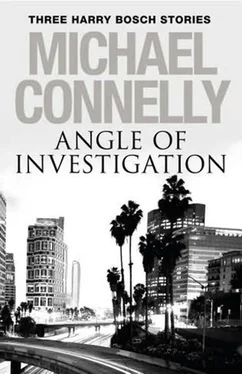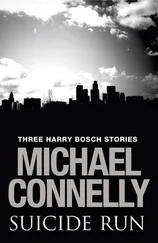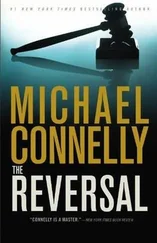He gave the sheet of paper to Bosch. It was a photocopy of the pawn slip. It contained the name, address and phone numbers of the customer. The man who had pawned Quentin McKinzie’s saxophone was named Donald Teed. He lived in the Valley. Nikolai Servan had given him $200 for the instrument.
Bosch sat down and noticed that Teed had listed his work phone number with a 323 area code and a Hollywood exchange. That might explain why a man who lived in the Valley had used a pawnshop in Hollywood. He picked up the phone and punched in Teed’s work number. It was answered immediately by a woman who said, “Splendid Age.”
“Excuse me?” Bosch said.
“Splendid Age Retirement Home, how can I help you?”
“Yes, is Donald Teed a resident there?”
“A resident? No. We have a Donald Teed who works here. Is that who you mean?”
“I think so. Is he there?”
“He is here today but I am not sure where he is right now. He’s a custodian and moves around. Who is calling? Is this a solicitation?”
Bosch felt things falling into place. He decided to take a shot.
“I’m a friend. Can you tell me if another friend of mine is there? His name is Quentin McKinzie.”
“Yes, Mr. McKinzie is a resident here. What is this about?”
“I’ll call back.”
Bosch hung up the phone and his eyes drifted to the saxophone.
Nikolai Servan opened his eyes the moment Bosch came through the door. Bosch put the piece of paper he carried down on the table and took the seat across from Servan, folding his arms and putting his elbows on the table in almost a mirror image.
“We’ve hit a snag, Mr. Servan.”
“A snag?”
“A problem. Actually a few imaually aof them. And what I’d like to do here is give you the opportunity to tell me the truth this time.”
“I don’t understand. I tol’ you truth. I tol’ you truth.”
“I think you left some things out, Mr. Servan.”
Servan clasped his hands together on the table and shook his head.
“No, I tol’ everything.”
“I’m going to advise you of your rights now, Mr. Servan. Listen closely to what I read you.”
Bosch read Servan his rights from the paper on the table. He then turned it around and asked the pawnbroker to sign it. He gave him the pen. Servan hesitated and seemed to slowly reread the rights waiver form all over again. He then picked up the pen and signed. Bosch asked the first question the instant the point of the pen came off the paper.
“So what did you do with the burglar’s lock picks, Mr. Servan?”
Servan held his lips tightly together for a long moment and then shook his head.
“I don’t understand.”
“Sure you do, Mr. Servan. Where are the picks?”
Servan only stared at him.
“Okay,” Bosch said, “let’s try this one. Tell me how you wired that display case.”
Servan bowed his head once.
“I have attorney now,” he said. “Please, I have attorney now.”
Bosch pulled to a stop in front of the Splendid Age Retirement Home and got out with the saxophone and its stand. He heard Christmas music drifting out of an open window. Elvis Presley singing “Blue Christmas.”
He thought about Nikolai Servan spending Christmas Eve and Christmas Day in the Parker Center jail. It would probably be the only jail time he’d ever see.
The District Attorney’s Office would not decide until after the holiday whether to charge him or kick him loose. And Bosch knew it would probably be the latter. Prosecuting the case against the pawnbroker was fraught with difficulties. Servan had lawyered up and stopped talking. Afternoon-long searches of his home, car, the pawnshop and the trash containers in the alley failed to produce Monty Kelman’s lock picks or the method by which the display case had been rigged to deliver the fatal charge. Even the cause of death would be difficult to prove in a court of law. Kelman’s heart had stopped beating. A burst of electricity had most likely caused ventricular fibrillation, but in court a defense lawyer could easily and most likely successfully argue that the burn marks on the victim’s hand and foot were inconclusive and possibly not even related to cause of death.
And all of these obstacles were minor in comparison with the main difficulty-the victim was a thief killed during the commission of a crime. He had engaged in repeated offenses against the defendant. Would a jury even care that Nikolai Servan had set a fatal trap for him? Probably not, the prosecutor told Bosch and Edgar.
Bosch planned to go back to the pawnshop the following morning. In his personal ledger, everybody counted or nobody counted. That included burglars. He would look until he found the picks or the wire Servan had used to kill Monty Kelman.
As he approached the front doors of the retirement home he noticed that not much about it looked particularly splendid. It looked like a final stop for pensioners and people who hadn’t planned on living as long as they had. Quentin McKinzie, for example. Few jazzmen and drug users went the distance. He probably never thought he’d make it this far. According to the information Bosch got off the computer, he was seventy-two years old.
Bosch entered and walked up to a welcome counter. The place smelled like most of the low-rent retirement homes he had ever been in. Urine and decay, the end of hopes and dreams. He asked for directions to Quentin McKinzie’s room. The woman behind the counter suspiciously eyed the saxophone under Bosch’s arm.
“Do you have an appointment?” she asked. “Evening visiting is by appointment only.”
“Is that to give you time to clean the place up before the kids come by to see dear old dad?”
“I beg your pardon?”
“I don’t need an appointment. Where is Mr. McKinzie?”
He held his badge up, a foot from her face. She looked at it for a long moment-longer than it took to read it-and then cleared her throat.
“He’s in one-oh-seven. Down the hall on the left side. He’s probably sleeping.”
Bosch nodded his thanks and headed down the hall.
The door to 107 was ajar. The light was on in the room and Bosch could hear television sounds coming from inside. He knocked softly and didn’t get a response. He slowly pushed the door open and stuck his head in. He saw an old man sitting in a chair next to a bed. A television mounted high on the opposite wall was droning. The old man’s eyes were closed. He was gaunt and depleted, his body taking up only half of the chair. His black skin looked gray and powdery. Despite the thin face and loose skin gathering below his chin, Bosch recognized him. It was Sugar Ray McK.
He stepped into the room and quietly came around the bed. The man didn’t stir. Bosch stood still for a moment, wondering what he should do. He decided not to wake the man. He put the instrument stand down on the floor in the corner. He then cradled the saxophone in it. He straightened up, took another look at the sleeping jazzman and nodded to him in some sort of unnoticed acknowledgment. As he headed out of the room he reached up and turned off the television.
At the door he was stopped by a raspy voice.
“Hey!”
Bosch turned. Sugar Ray was awake and looking at him with rheumy eyes.
“You turned off my box.”
“Sorry, I thought you were asleep.”
He came back into the room and reached up to turn the television on again.
“Who are you, boy? You don’t work here.”
Bosch turned to face him.
“My name is Harry. Harry Bosch. I came-”
Sugar Ray noticed the saxophone sitting in the corner of the room.
“That’s my ax.”
Bosch picked up the saxophone and handed it to him.
“I found it. I saw your name in it and I wanted to get it back to you.”
Читать дальше












![Майкл Коннелли - The Night Fire [Harry Bosch - 22]](/books/405630/majkl-konnelli-the-night-fire-harry-bosch-22-thumb.webp)